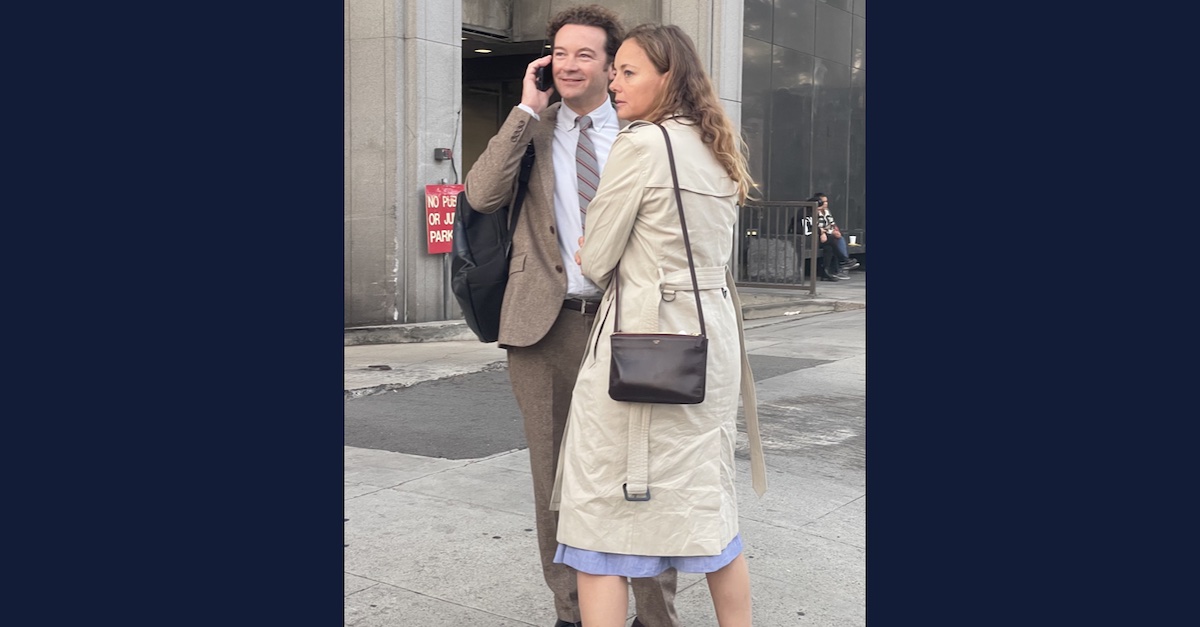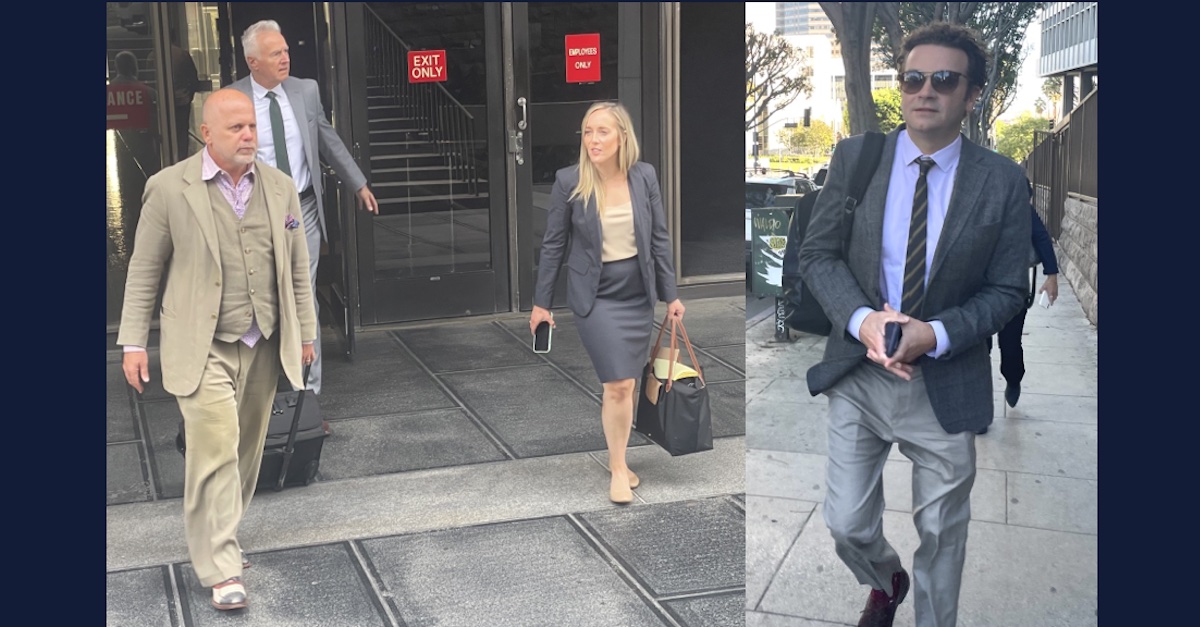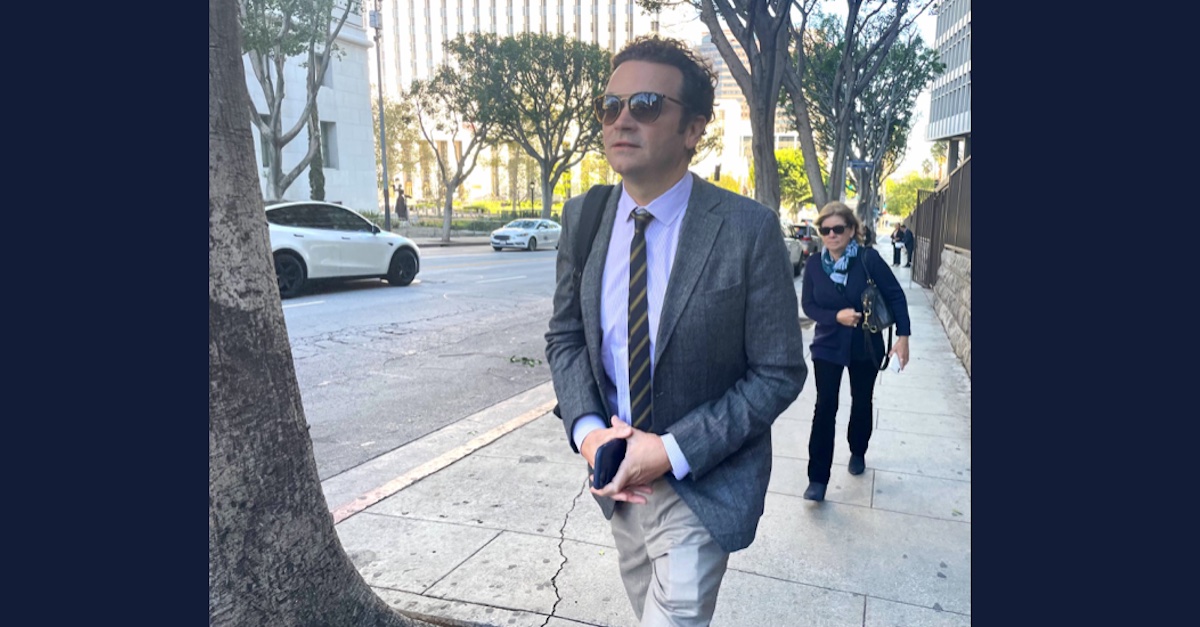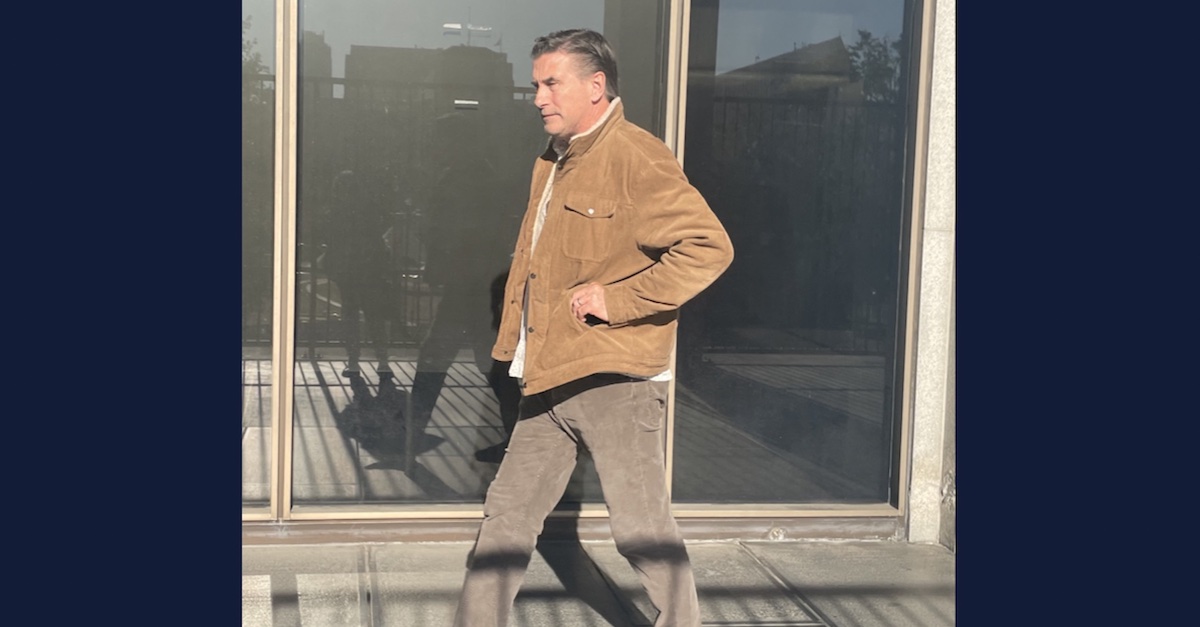
Danny Masterson and his wife, Bijou Phillips, outside the main courthouse in downtown Los Angeles following closing arguments in his rape trial on Nov. 15, 2022. (Photo by Meghann M. Cuniff/Law & Crime)
When the jury in actor Danny Masterson’s rape trial returns to court next week to continue deliberating, they’ll be doing so under a controversial legal concept born in federal court that is barred in some states while frequently applied in others.
California is among several states that have revamped a jury instruction allowed under Allen v. United States, an 1896 U.S. Supreme Court decision that says a court can instruct deadlocked jurors to reexamine their views in what is known as an “Allen charge.” Other states have barred its use completely, including Oregon, Alaska and Pennsylvania, but California’s instruction survived a major challenge 45 years ago that whittled it down from the lengthier version that survives in U.S. District Court.
Los Angeles County Superior Court Judge Charlaine F. Olmedo cited the California Supreme Court case on Friday when explaining her planned response to the jury trying to decide whether to declare Masterson guilty or not guilty of three counts of forcible rape. The judge announced about 2 p.m. that the foreperson sent a note at 1:40 p.m. “indicating that they are unable to reach a unanimous decision on any of the counts.”
In some states, a mistrial would be declared because of a hung jury, and prosecutors would decide whether to retry Masterson in front of another jury, which after one mistrial is common.
But in California, state court judges often tell juries they haven’t deliberated long enough to declare themselves deadlocked, which is what Olmedo chose to do on Friday. Some won’t, just as some federal judges won’t, but the practice is so widespread in California that longtime criminal defense attorney John Barnett said he “can’t think of a case where the judge refused to give some variation of that.”
“I don’t have a recollection of a judge just saying, ‘No. If they’re hung, they’re hung,'” Barnett told Law&Crime in a phone interview. The instruction “almost never favors the defense” and “has a tendency to wear down jurors,” he said.
“I know there’s a desire to have verdict so the cases don’t have to be retired again, but that’s contrary to what the intention of the jury process is,” Barnett said. “It interferes with the requirement of unanimity.”
Paul Meyer, a longtime criminal defense attorney in Costa Mesa, California, told Law&Crime he’s seen 10 hung juries in state court and one in federal court as a trial lawyer, despite the propensity of some judges to try to break deadlocks through furthered deliberations.
“Reasonable doubt is a sacred concept, and judges are and should be very cautious in employing a crowbar to move a holdout juror,” Meyer said in an email. “Some do not feel it is warranted. It is a case-by-case decision.”

(l-r) Defense attorney Philip Cohen, Deputy District Attorney Reinhold Mueller, Deputy District Attorney Ariel Anson, actor Danny Masterson. (photos by Meghann M. Cuniff/Law & Crime)
Masterson’s lawyer Philip Cohen objected to the jurors not returning until Nov. 28, but Olmedo said trials often break for holidays and five jurors had travel plans and childcare commitments.
Masterson, 46, is charged with three counts of forcible rape involving three women between 2001 and 2003, when he was starring on That ’70s Show as Steven Hyde. He faces 45 years to life in prison if convicted.
Masterson’s membership in the Church of Scientology has been part of the trial, as has the former membership of his alleged three victims. Olmedo ruled Scientology could be mentioned for five reasons: why the alleged victims didn’t contact police sooner; their fears of being declared a “suppressive person” within Scientology; the alleged harassment they’re experiencing by the Church of Scientology; and past and present ties to Scientology as it relates to their current state of mind.
It’s unclear how split jurors are and for what reasons. They asked early in deliberations if they could see a poster board Cohen showed them in his closing argument that defined reasonable doubt, as well as a police report regarding the first victim who testified, Jennifer B., but neither is in evidence so Olmedo didn’t let them see either. They later requested transcripts of testimony about a phone call between Masterson and the woman, but Olmedo wouldn’t allow give it to them and instead had them listen to the court reporter read back the testimony.
Cohen noted the dearth of questions when telling Olmedo on Friday that the jurors appear to simply disagree about what the evidence shows. Still, he said when arguing against them taking the week of Thanksgiving off that he was “not necessarily” opposed to them being told to continue deliberating, which in California is a much more watered down instruction than the federal court instruction that serves as its case law umbrella.
The revisions followed the California Supreme Court’s 1977 ruling in People v. Gainer that the Allen charge’s existing language injects “extraneous and improper considerations into the jury’s debates,” including an instruction that dissenting jurors should reconsider their views. California’s evolved version strips that language — the Masterson jurors weren’t told anything like it — in favor of an instruction more in tune with recommendations from American Bar Association, which focuses on the length of deliberations.
Meanwhile, the Allen charge thrives in U.S. District Court. Some judges such as now-retired U.S. District Judge Andrew J. Guilford in the Central District of California would not read them to juries out of concern for coercing a verdict. But others use it liberally. U.S. District Judge Jesse M. Furman in the Southern District of New York read jurors a multi-paragraph variation of an Allen charge on two occasions during deliberations in the high-profile trial of disgraced lawyer Michael Avenatti for defrauding Stormy Daniels.
Here’s the full filing with the jury notes. It includes Judge Furman’s responses to the notes. https://t.co/5jZiUgNLc3 pic.twitter.com/lwi2pfTgCV
— Meghann Cuniff (@meghanncuniff) February 4, 2022
The single juror who was refusing to find Avenatti guilty eventually changed her vote, and Avenatti was convicted on both counts of wire fraud and aggravated identity theft.
In Masterson’s case, jurors announced they were deadlocked midway through their third day of deliberations, but attorneys said during a discussion with Judge Olmedo that the actual deliberations had not taken up all that time.
The judge appeared adamant from the beginning of the discussion that jurors hadn’t deliberated long enough to declare a deadlock. She’s a former assistant U.S. attorney who was appointed to the state bench in 2002 by California Gov. Gray Davis (D) in 2002. In her current assignment, she’s one of several Los Angeles County Superior Court judges presiding over complex criminal cases on the main downtown courthouse’s famous 9th floor, where historic trials such as the O.J. Simpson’s 1995 murder trial were held.
Masterson’s trial coincided with disgraced movie mogul Harvey Weinstein’s sexual assault trial down the hallway, with Masterson’s trial regularly drawing larger crowds that Weinstein due to both the size of the courtrooms and the number of supporters there for Masterson, who is out of custody on $3.3 million bond.
Along with a row of journalists, Masterson’s trial was usually full of onlookers, including Scientology lawyers and other representatives as well as cult watchers and occasionally former Scientology members, many of whom say the church is a dangerous cult.

Actor Danny Masterson leaves the Clara Shortridge Foltz Criminal Justice Center in downtown Los Angeles on Thursday, Nov. 3, 2022. (Photo by Meghann M. Cuniff/Law&Crime)
But the most dominant showing was from Danny Masterson’s family, who along with some friends mostly filled the left side of the gallery every day of trial. They waited for a verdict in the hallway all last week, with Masterson’s mother, Carol Masterson, always there, along with his younger brother, Christopher Masterson, who played oldest brother Francis on Malcolm in the Middle. His youngest brother Jordan Masterson, who played in Mark in The 40-year-old Virgin, also sometimes attends, as does their sister, Alanna Masterson, who was Tara Chambler on The Walking Dead.
Masterson’s wife, Bijou Phillips, has also watched the entire trial, and she’s often joined by her older half sister, singer Chynna Phillips, who was in the band Wilson Phillips with the daughters of Beach Boy Brian Wilson. The Phillips sisters’ father is John Phillips, the late lead singer of the Mamas & the Papas.
Chynna has been joined recently by her husband, actor William “Billy” Baldwin, the third of four Baldwin brothers. While each Masterson is a longtime Scientologist, Chynna frequently discusses her Christianity on her YouTube. She was wearing a large cross around her neck when she and Baldwin confirmed their identifies to a Law&Crime reporter the other week. Scientologists do not recognize Christ as a deity.
Judge Olmedo sometimes stopped testimony and questioning about Scientology she felt was veering too far afield. Along the way, though, jurors learned little about the Church of Scientology as an organization while being frequently instructed that testimony about alleged harassment and stalking was to be taken not for the truth but when considering the statement of mind of the witness.

Actor William “Billy” Baldwin leaves the criminal courthouse in downtown Los Angeles after awaiting a jury verdict in the rape case against Danny Masterson. Masterson is married to Baldwin’s wife’s half-sister. (Photo by Meghann M. Cuniff/Law&Crime)
Still, they heard testimony about apparent attempts by church officials to shield Masterson from investigation, including Jennifer B. testifying about a meeting with Scientology’s Julian Swartz in which he warned she could be “declared a suppressive person,” which essentially involves being ostracized from the church, if she reported Masterson to police. The woman also said she was told not to use the word “rape” to describe what had happened with Masterson.
Masterson’s former girlfriend Chrissie Carnell-Bixler also testified extensively about the church’s response to her claims Masterson had raped her, including going through therapy sessions and being told that submitting to Masterson’s sexual whims was her duty. She testified she’s currently being harassed and stalked by the church, as did her husband, Cedric Bixler-Zavala, who is the lead singer of the rock band The Mars Volta.
Asked about Scientology testimony’s possible affects on juries, Barnett called Scientology a “lightning rod” akin to QAnon in its divisive capabilities.
“It’s very controversial, and it does electrify the imagination,” Barnett said, who’s handled some of the most high-profile state court criminal trials in the last few decades, including successfully defending one of the Los Angeles police officers who beat Rodney King in 1992.
But, he said, “It is an unknown. It certainly has an effect. You just don’t know how it works or how it will work.”
[Images: All photos by Meghann M. Cuniff/Law & Crime]